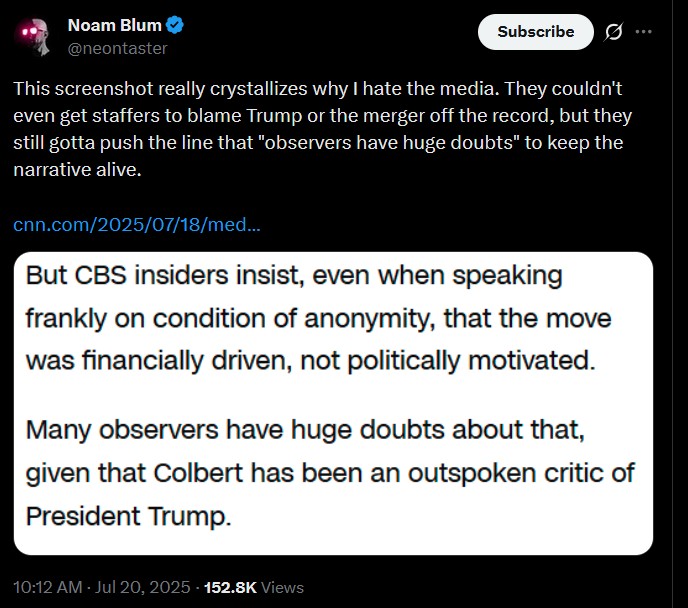


NPR's top editor has tendered her resignation days after the radio station lost $500million in federal funding for an alleged bias against conservatives.
Edith Chapin, who serves as editor-in-chief and acting chief content officer at National Public Radio, announced her departure on Tuesday.
Chapin told an NPR reporter she quit rather than being fired and that she was not leaving due to the funding cuts.
I mean...
She also said she handed in her notice two weeks ago ahead of the cuts, which Trump repeatedly promised on the campaign trail.
...
Supporters of the cuts to federal funding - which also affected PBS - said it was unfair to expect all Americans to subsidize a network with such an isolated worldview.
...
'I have had two big executive jobs for two years and I want to take a break. I want to make sure my performance is always top-notch for the company,' she said, after joining NPR from CNN in 2012 as chief international editor.
'It's not a good time to do it, but it's never a good time.'
'I needed to pick a date and share my decision.'
'The best thing we can do is do the best work possible every day,' she said as debate continues over whether the company really engaged in systemic bias as the administration claims.
'We need to hear from all kinds of people - and that is our job.
'And we need to be as clear and transparent as we possibly can, and our audiences can decide how useful we are for them.'
'One of the things that was attractive when I came here was this philosophy of all things considered,' she continued.
...
Maher also addressed statistics that showed the broadcaster having 87 registered Democrats on-staff this time last year and not a single Republican.
The disparity, Maher conceded, was 'concerning - if true.' She insisted NPR does not track such affiliations.
Apparently this editor was hired to review stories for "fairness and balance."
Crackerjack job.
I don't know what's going on here, but here's my speculation: This woman was hired as a fig-leaf concession. NPR had been exposed as hopelessly leftwing by Uri Berliner, who they then suspended and forced out, and they needed to placate Congress by pretending they cared about balance.
But the moment Congress cancelled their funding, they decided they were all done with this very weak effort at pretending, so they had no further use of their "fairness and balance" fig-leaf editor.
NPR's batty wine-aunt CEO says that Republicans cancelled funding for her perverse propaganda network just because they don't want people of marginalized communities to have voices.
"This argument about public media being 'biased' is a stalking horse. We report on soybean farmers and LGBTQ activism. We report on coal miners and eco-warriors," she continued. "Having non-White voices and perspectives on air does not make us woke. Covering the existence of disagreement and difference in our country does not make us biased. It makes us reflective of the complex, diverse nation we serve."
Maher said NPR would "take a moment to mourn" and ultimately move forward.
Ex-NPR editor Uri Berliner roasted the outlet last year over its biased coverage on such issues as COVID-19, Hunter Biden's laptop and the Russiagate saga. He soon after resigned and joined The Free Press.
Woke white CEOs are very eager to deny job opportunities to white men to give the jobs to "diverse, marginalized people." Strangely, they never give up their own jobs, despite being whiter than Bjork's thighs in winter.
And now: a former NPR CEO says that maybe we don't need state media at all.
What a concept!
Related: Brian Stelter continues his Colbert Denialism, refusing to concede that Paramount may have cancelled Colbert for the reasons that they've stated: Financial ones. Colbert was losing $40-50 million per year with no hopes whatsoever of a ratings recovery.
Related:
Waste of the Day: "Make Art Great Again"
By Jeremy Portnoy, RealClearInvestigations
July 25, 2025
Topline: Erin Elmore, director of the State Department's "Art in Embassies" program, has vowed to "Make Art Great Again," and taxpayers will be footing the bill.
The Art in Embassies program has spent at least $6.4 million on grants and contracts since 2008, according to OpenTheBooks' review of federal spending data.
Key facts: Art in Embassies was created in 1964 with guidance from first lady Jackie Kennedy to display U.S. artwork in diplomatic buildings around the world.
Since then, its spending has arguably gotten out of hand. There is artwork displayed in 189 countries including Suriname, Malta and Tajikistan. Since 2008, taxpayers have spent $361,805 to display artwork in Beijing and $8,000 on artwork in Moscow.
Insurance for the artwork has cost at least $416,000 since 2008, including $111,382 in the past year. Shipping has cost $202,370.
During the government shutdown in 2019, the State Department spent $84,375 to install a sculpture of Bob Dylan in Mozambique.
In 2021, the program bought a "brass Art in Embassies medal with 4.25 rosewood presentation box" for $799. The program also spent $24,909 for a "catering event" in May 2023.
This year the State Department planned to spend $2 million on seven sculptures, including a $650,000 "triple-height suspended sculpture" in Brazil and a $105,000 "textile work" in Malawi, but the purchases were cancelled, according to PBS.
According to its X account, Art in Embassies has been "cultivating diplomacy thru art in U.S. embassies since 1963" as the "Department of State's heart of art." The program has stuck around despite a planned 15% reduction to the Department of State's staff headcount.
